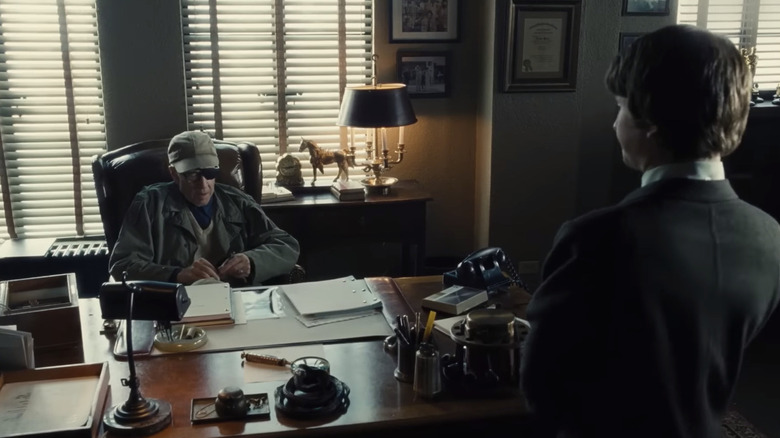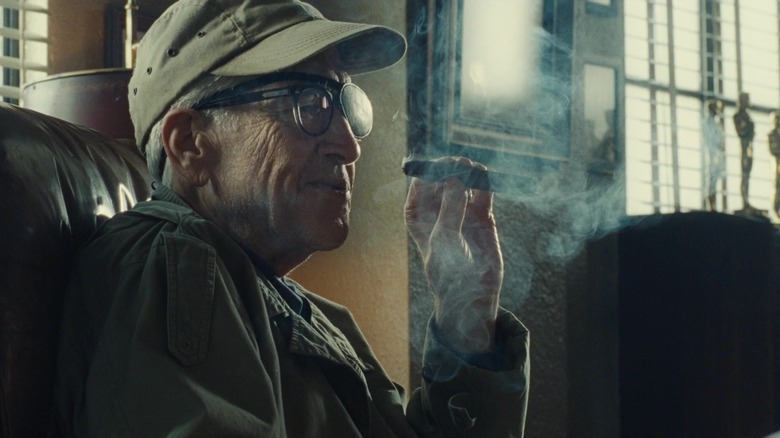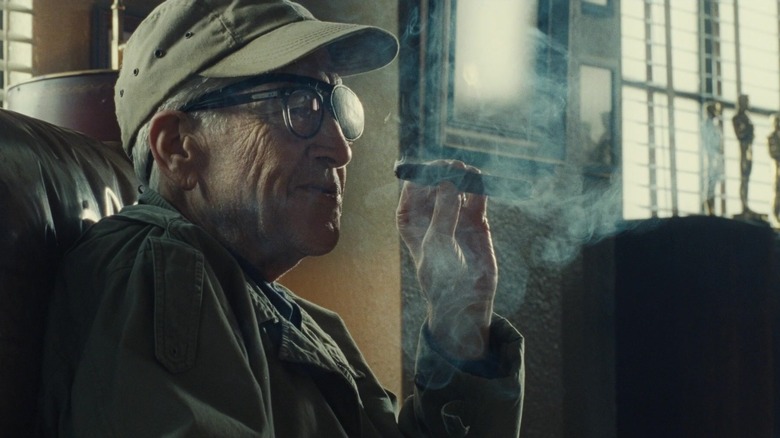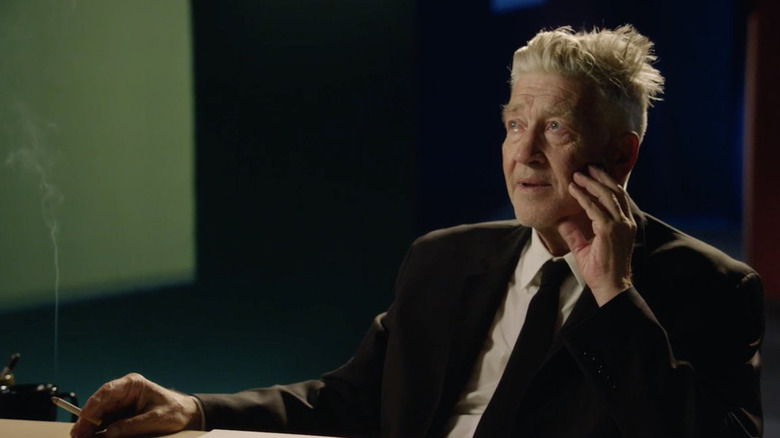David Lynch's Final Onscreen Performance Couldn't Have Been More Perfect
David Lynch is gone, and I'm not handling it well. Lynch was the very definition of a singular artist — there will never be anyone else like him. For over 50 years, Lynch was a filmmaker who almost never compromised, making unique, challenging, mind-blowing art on his own terms. We were immensely lucky to have him, and we are worse off without him. Perhaps we all should've known this was coming — death eventually comes for us all, and last year, word broke that Lynch's health had deteriorated due to emphysema (a fact Lynch confirmed on Twitter/X). And yet, a world without David Lynch feels almost cosmically wrong. I'm sure I wasn't alone in thinking that despite poor health, Lynch would somehow keep on going, and somehow make another movie or TV show again. Just one more.
In addition to his unique directing career, Lynch would sometimes act. Not only did appear as the frequently shouting Gordon Cole in his own "Twin Peaks," but he made appearances in things like the movie "Zelly and Me," comedy shows like "The Cleveland Show" and "Louie," and the John Carroll Lynch film "Lucky." As it stands now, Lynch's final on-screen performance was in another filmmaker's work: Steven Spielberg's semi-autobiographical drama "The Fabelmans." It is utterly heartbreaking to have lost David Lynch, but there's something sweet about this final film role being so memorable and so brilliant as his brief, scene-stealing turn in Spielberg's movie. Lynch plays another famed director, the legendary John Ford. He doesn't show up until almost the final scene of the film, and yet when he arrives, it results in an almost instantly iconic moment that essentially elevates an already good movie to a whole other level.
How David Lynch ended up in The Fabelmans
Long before he made "The Fabelmans," Steven Spielberg would frequently tell the story of how he met the legendary John Ford (you can even watch Spielberg tell the story right here). Spielberg was about 15 at the time, and through fate or luck, he was able to land a very brief meeting with the director behind "Stagecoach," "The Searchers," "The Man Who Shot Liberty Valance," and so much more. When it came time to make "The Fabelmans," a movie heavily inspired by Spielberg's youth, it made sense to include the Ford meeting. But who would play Ford? Mark Harris, husband of "Fabelmans" co-writer Tony Kushner, came up with the perfect casting idea: David Lynch. Spielberg said "the light bulbs went off the second I heard that name," and set about casting Lynch in the small-but-pivotal role.
Spielberg went through his "Jurassic Park" star Laura Dern, a frequent muse of Lynch, to ask Lynch to play the part. But Lynch wasn't entirely sold on the idea. "At first I didn't want to do it," Lynch said to Empire. "And the reason is, when it comes to acting, I've purposely tried to stay away from it, giving the likes of Harrison Ford and George Clooney a chance at their careers." Eventually, though, Lynch came around on the idea, and had one specific request: a big bag of Cheetos. "Well, Cheetos, number one, I love them," Lynch recalled. "And any chance I can, I get them ... If I do get them, I want a big bag."
Cheetos secured, Lynch slapped on an eye patch, grabbed a cigar, and ended up in the best scene in the film.
The 'Where's the horizon?' scene might be the best moment in The Fabelmans
"The Fabelmans" focuses on Sammy Fabelman (Gabriel LaBelle), an avatar for Spielberg. Sammy is a budding filmmaker who grows obsessed with making his own movies, all while the marriage of his parents (played by Michelle Williams and Paul Dano) crumbles. The film is essentially a cinematic therapy session for Spielberg — his parents' divorce has long been an influence on his work, and with "The Fabelmans," he gets to tackle it head-on. While the movie is frequently loaded with dramatic, somber moments, and there's an underlying message that devoting your life to art can leave you ultimately lonely and isolated, "The Fabelmans" is also a warm, funny movie. And the warmest, funniest scene arrives at the end. As the movie nears its conclusion, Sammy is considering dropping out of college. He badly wants to be a filmmaker but is struggling to break into the biz. He gets a life preserver of sorts when he lands an interview to work on the TV series "Hogan's Heroes."
During the course of the interview, Sammy makes it clear that movies are where his heart lies, not TV. The series co-creator is receptive to this, and points out that he shares office space with a legendary filmmaker. Would Sammy like to meet him? Sammy says yes, of course. We quickly learn that the filmmaker is none other than John Ford, and while Sammy waits nervously in Ford's office, Ford eventually barges in. Because Ford is played by David Lynch, the role immediately carries a kind of weight. Here is a legendary filmmaker playing a legendary filmmaker. Sporting an eye patch and chomping on a cigar, Ford drolly observes that he's heard Sammy wants to "make pictures." He then asks Sammy what he knows about filmmaking — a question that understandably makes Sammy nervous. Ford, ever the director, gives Sammy a task: he asks him to walk over to a traditional Western-style painting on the wall and tell Ford what he says.
Sammy stammers his way through trying to describe what he glimpses in the painting. Ford, immediately annoyed, tells him that's not what he wants. "No, No," Lynch-as-Ford says, then asks: "Where's the horizon?" Lynch puts the perfect amount of inflection on the question, making it sound both simple and loaded. Sammy, confused, responds that the horizon in the painting is at the bottom. Ford directs him over to another painting. Once again, Sammy awkwardly tries to describe what he's seeing, but again, Ford makes it clear he just wants to know where the horizon is. In the painting, it's at the top. Satisfied, Lynch's Ford is finally ready to impart some wisdom. "Now remember this," he says, "When the horizon's at the bottom, it's interesting. When the horizon's at the top, it's interesting. When the horizon's in the middle, it's boring as s***. Now, good luck to you. And get the f*** out of my office!"
David Lynch's final role
The scene is brilliant in how blunt and hilarious it is — I was lucky enough to attend the movie's worldwide premiere at TIFF, and I distinctly remember how this moment pretty much brought the house down. It's also oddly sweet thanks to how Lynch plays it. He's short-tempered and even a little rude with Sammy, but when he offers those final words — "Now, good luck to you" — it sounds like he means it, even if he follows it up with "And get the f*** out of my office!"
In regards to shooting the scene, Gabriel LaBelle recounted that he was "really nervous," and that nervousness was only heightened by the presence of an almost mythical figure like Lynch. But when filming was done, Lynch did something genuinely sweet. "The only interaction David and I had, as people, was at the end of the scene," LaBelle said. "At the end of the day, he gets out of his chair, and he gives me a hug, and then he leaves."
Spielberg also puts a button on the moment: after nearly fleeing, Sammy pokes his head back into thank Ford. He means it: he's legitimately thankful that this great man took the time to give him advice. "My pleasure," Lynch's Ford says, and Lynch gives a sly little smile as he puffs on his cigar. It's a lovely, perfect moment, and the fact that this is our final big screen performance from Lynch feels overwhelming and beautiful. None of us could've known at the time that this would be the last time we saw Lynch in a movie, but I'm happy he got to go out on this note.
Farewell, David Lynch. I hope you find the horizon. And I hope wherever you are going now, they greet you with a big bag of Cheetos.



